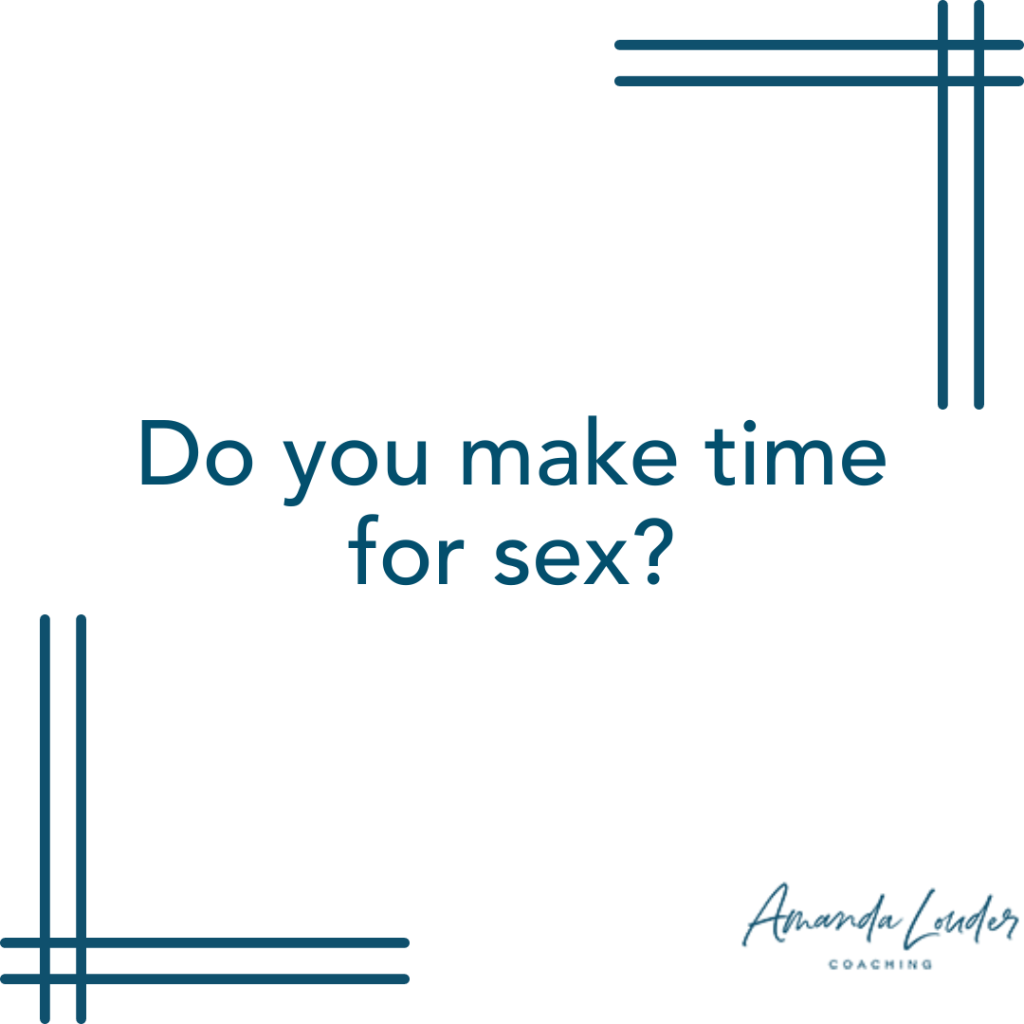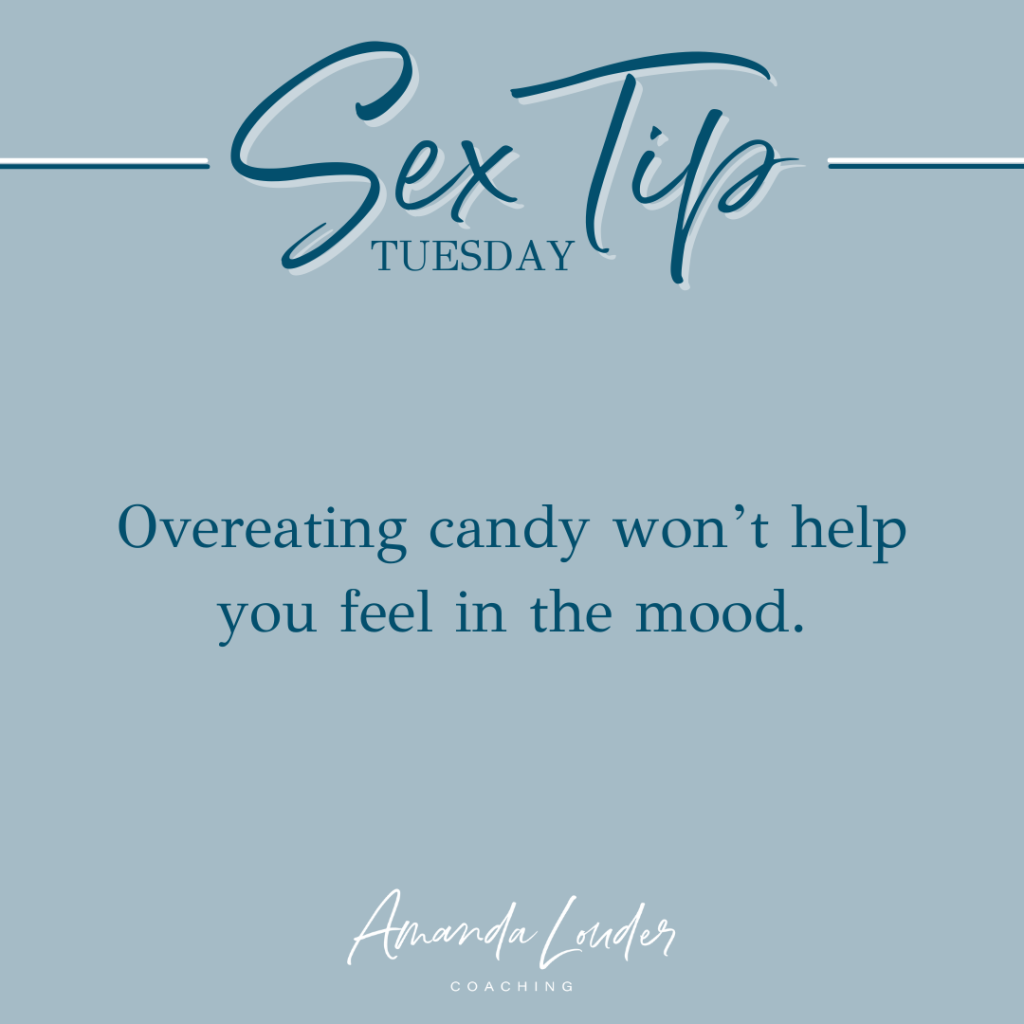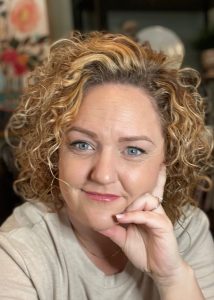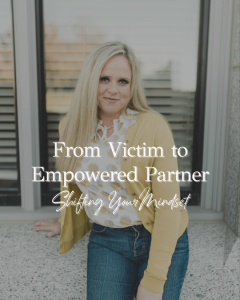
Have you ever thought about how food can affect your sex life? That’s what I’m discussing today with my guest and fellow life coach Lisa Salisbury. Thinking about what you put in your body and what you want from your body are important. But, let me be clear, we’re not talking about counting calories or macros or anything like that. We’re talking about listening to your body and knowing that if you’d like to have sex tonight, it might be better to not finish your meal and be overly full. I’m so excited for you to hear this interview. It is a great one!
Lisa Salisbury is a life coach for health and weight loss for women who want to lose weight without counting and calculating their food. As a former chronic dieter, Lisa knows what it’s like to be all-consumed with everything that goes into your mouth. It was only when she learned the tools and skills through coaching that she was able to drop the dieting obsession and drop her weight!
Lisa is a certified Health Coach through Institute of Integrative Nutrition and a certified Life Coach and Weight Loss Coach through The Life Coach School. She also has a BS from Brigham Young University in Health and Human Performance.
She takes her clients through a 12 week program designed to help them eat well, think well and live well. When you learn the skill of paying attention to your body and losing weight, you’ll be surprised at how it translates into other areas of life. Craving chocolate & craving more instagram? Same solutions. Avoiding vegetables/protein & avoiding your to-do list? Same solutions. You can hear many of these tools on her podcast Eat Well, Think Well, Live Well.
You can find Lisa on:
Her website: wellwithlisa.com
Instagram: @well_with_lisa
Her podcast: Eat Well, Think Well, Live Well
And download her go to meals guide at: https://view.flodesk.com/pages/625f1d3d96808aece7b0ee33

Show Notes:
Follow Amanda on Facebook and Instagram.
Join Amanda’s Private Facebook Group.
Show Summary:
Amanda: Hello, my friends. Welcome back to the podcast today. Let’s get to today’s interview.
Taking care of yourself in all areas is an important aspect of sexuality.
If you’re stressed, sexual interest often goes down. If you’re tired, you’re probably not as interested in sex. If you don’t feel good about your body, that can definitely inhibit your desire to have sex. On today’s podcast, I have Lisa Salisbury, who is a health and weight loss coach. I met Lisa at the LDS life coaches retreat last year.
Today, we are going to talk about the importance of taking care of yourself in all aspects of your life so that you can feel your best and show up as your best self in your life and in your sexual relationship.
Welcome to the podcast, Lisa.
Lisa: Thanks. Thanks for having me.
Amanda: Why don’t you introduce yourself to my audience?
Lisa: Okay, great. So my name is Lisa Salisbury. I’m a health and weight loss coach. I am certified with the life coach school, as you are, as well as I have a health coaching certification from the Institute for Integrative Nutrition. So I don’t know how much background you want on how I got into this.
Amanda: You tell me whatever you want to.
Lisa: So essentially I was a chronic dieter and really started being aware of my weight and the, um, air quotes. I’m going to put this wrongness of, of the way my body looked when I was pretty young, like 6th, 7th grade, um, really went on my first official diet in high school and I brought that one home from a friend.
My parents were like, Oh, we’ll do that with you. And so that was interesting as I look back, it’s like, you know, maybe they should have said like, You’re beautiful and there’s no need for this and let’s, yeah, you know. Focus on some healthy foods, but no, we ate and measured out a half a cup of cottage cheese and two tomatoes for breakfast and that sort of thing.
So, um, that’s kind of where my weight loss started and then fast forward to my twenties, I started having babies. And so then I’m pregnant or nursing for like nine years. And in between time, I’m just doing everything I can to, you know, get my body back and all of these kinds of things that we think are required between pregnancies.
And so it just essentially set me up for not enjoying that newborn time and just focusing on dieting. And I feel sad about that sometimes. Like, could I have done a better job when the kids were young if I hadn’t been so concerned about the way my body looked? I don’t know. I just know that when I got pregnant with my last and I knew she was going to be my last, I remember having this thought, well, this is the last time it’s okay for me to be fat so I can eat whatever I want.
And now looking back, it’s like, Oh, I really, really do want to just like take that past self and just like wrap her in my arms and be like, that’s not what’s happening here. Let’s eat to nourish this baby. Let’s eat to, you know, prioritize the things that help the baby grow and help you feel good and all of those things.
But I just had so little permission for the way my body looked in all it’s stages.
And so after I had that baby, I was like, okay, here we go, this is it. And so, um, I ended up kind of on the slippery slope of orthorexia. I’m not sure if you’re familiar with that, but it’s an eating disorder where you have an obsession with eating healthy. So it’s not like some of the others where you have like anorexia, where you don’t eat at all or, um, where there’s binging and purging.
But the problem is that you have to eat a certain amount of each food each day. And it can be associated with really intense counting type diets. So for me, it was macro counting. And I know a lot of people have success with that. So I’m not vilifying any one particular way of eating. I think there’s lots of ways that can work for people, but macro counting really sent me down, just really high anxiety. And so things like I can’t go to someone else’s house and eat what they’ve prepared because I don’t know how many protein macros are in that. I would call restaurants multiple times, you know? Oh, we’ll email you our nutritional information, because it was like a small restaurant and they didn’t, and I called like three times that day. Are you going to email that to me because I needed to log it? See how it’s kind of like, it’s just a little weird. Right? It’s just a little extreme.
Amanda: It’s just a little extreme.
Lisa: Yeah. And so when I came into the life coach school concepts and really started to adopt some of the ideas of listening to my body for the cues of when to start eating and when to stop eating, instead of checking in with my diet app, like, well, what can I eat? What does the diet app tell me? I have room for, for example, you know, it also caused a little bit anxiety. Like, well, how will I know what will, what if I can’t lose weight? What if I gain weight doing this? And just finally, finally deleting my diet apps, sitting down with a plate of food and just letting my own body decide how much to eat was really kind of liberating.
And anxiety ridden all at the same time, but continue to drop that anxiety and be like, of course you’re nervous because this isn’t how we’ve done it for 30 years. And so, um, so that’s really what I teach is I teach women how to drop their diet, to ditch their diet apps and check in with their body.
And just gain a healthy relationship with food. All food is allowed if you will. And it just provides for so much more flexibility in your diet, which I think is ironic since the whole shtick of macro counting is flexible. It’s really not though.
Amanda: Not so much, not so much. I know I relate to that so much. Um, when I was married to my first husband, our entire marriage revolved around my weight. my size, how much I ate, how much I exercised. And so I spent many, many years, um, going up and down, up and down, up and down, whether I complied to what he wanted or rebelled.
And, um, I would definitely say that I came from a family with very disordered eating and it just perpetuated within my marriage. And when I married my second husband, he was much more balanced, you know, he was like, we just eat whatever, you know, fuel our bodies well. And it totally just changed my perspective.
And so I feel like I’ve kind of come into that same place where I just, I really listened to my body and the, you know, hunger cues and the fullness cues and I eat everything. Um, but yet like, I don’t feel bad about any of it. And I feel like things are way more balanced than they used to be and it feels so much better.
Lisa: Yeah, it really does. And to your point about coming from a family with disordered eating, I think it’s such a good distinction that there’s disordered eating that isn’t eating disorders there. Right? Like, you don’t have to be diagnosed with an eating disorder, which is why I said I was kind of going down the slope of orthorexia.
It was for sure disordered eating. Anytime you’re severely limiting any particular groups of food, types of food. Using words like I can’t, I shouldn’t, I’m not supposed to around food unless you have an allergy, right. Unless you’re like peanuts will kill me right then you can say I can’t eat peanuts, but otherwise you totally can.
Amanda: Well, and I think, I mean, part of that comes with listening to your body to like, I notice because I pay attention that when I have a lot of milk products, I don’t feel as good.
And so that I don’t ever say, no, I can’t have milk products. Like I can absolutely. I just know that if I eat them, that I’m not going to feel as good in my body. And so I tend to not eat as much or very little just because I feel better when I don’t. Not because I can’t or I shouldn’t. And just that little change in the way that I think about it and the way that I talk about it completely, changes my perspective.
Like if I want a bowl of ice cream, I will eat a bowl of ice cream. I just know I might pay for it later.
Lisa: Yeah. And it’s such a good experiment. Really when you’re trying to figure out like why do I get some nausea sometimes and then you decide to cut out some ingredients. It’s such an informative experience. You probably figured that out because you’re like, let me try not eating dairy because you’re just like experimenting with that and it’s just such good Information because now you’re like, okay, I know what causes it and now I can decide, am I in for the symptoms, or am I not all in for it? Like, what’s going on tonight? What’s going on tomorrow? Could I handle some nausea? Like, well, no, I’m going to be on a plane for six hours. That would not be comfortable. Okay. I’m going to not have the ice cream.
Like it’s just good information. So you could make quality decisions.
Amanda: Yes. Well, I think that leads us perfectly into one of the things that I wanted to talk about today is, um, you said that you often see with your clients, their choices in what they’re eating affect how they’re showing up in their sexual relationship, like overeating on date night.
Can you tell me a little bit more about that?
Lisa: Yeah. So. Um, one of the things I coach on a lot is overeating. That’s primarily the reason that people come to me is they want to stop overeating. They want to stop eating too much for their body. And I just had this one particular client. She’s like, it’s so weird because we plan these date nights. And then, you know, I’m thinking it’s this special time that we have out to dinner. We never go to this restaurant, all these thoughts that keep you eating at restaurants. And then we go home and I don’t want to finish date night. And I’m like, so, and you know what she meant was she’s like, I don’t feel like having sex when I’m so overly full.
And there’s so many reasons to not overeat. And you have to find, so I talked to my clients a lot about finding, and you know, the buzzword is finding your why, why do you want to lose weight? Why do you want to get healthier? Why do you want to have a healthy relationship with food? Why do you want to stop overeating?
And without fail, people say, I want to be healthy. And I’m like, that’s not enough. No one stops eating. No one. No one puts down their fork and goes, I just want to be healthy. No one. So we have to have real reasons. And because I want to have sex tonight is a very good reason because a lot of times we think of these super long term reasons because weight loss is long term, you know, improving relationship with food. That is a long term reason. And so I always encourage them, let’s have a really short term reason. Just like, I’m going to avoid dairy because I have XYZ going on tomorrow and I do not want to be gassy. So it’s like a short term reason and, and really short term, I want to sleep well tonight. I’m not going to overeat this because I know when I am going to bed and I have too much food in my stomach, I don’t sleep well.
And for the same reason, if I have too much food pushing on my stomach, I do not feel like having sex and it is a big deal because it works well, it works really well as a short term reason to eat the amount of food that feels amazing in your body.
Amanda: Yes. And you can always pack up the rest and eat it later. You don’t have to eat it all at the restaurant. I love take home boxes. I use them all the time. Because something that I’ve really, really paid attention to is stopping when I’m full. Because I used to chronically overeat like, Oh, this food is just so good, I don’t want to stop eating it. Right. And now I’m like, it’ll be good tomorrow too. So I’m going to stop eating it tonight so that I can actually feel better. And I’ve started to recognize, this is in the last maybe five years or so, like really what my body, um, feels like and what it does when I’m full, which if you’re not looking for it, you miss it. And then you end up way over eating and not feeling good later.
Lisa: And there’s really just such a point of diminishing returns when we’re eating good food, because by the way, I eat good food all the time. I love food. I do not eat like chicken and broccoli, plain, no, gross. But there’s this point of diminishing returns where you’re like, this is so enjoyable.
First, we want to start eating when we are hungry, because that’s the best time to start eating. Right. If someone’s like, Oh, do you guys, you know, want to eat and you’re offered food and you’re like, I just ate, or I’m just not hungry. It doesn’t, it doesn’t really taste as good. It doesn’t really, it’s not as enjoyable as when you are hungry.
And likewise, if you’re super hungry, if you’re like, Oh, I’ve got a date night tonight, I’m not going to eat all day. Then it’s actually uncomfortable to start eating because you’re all cramped up. So you want to like feed your body properly throughout the day. Wait for hunger. So you’ve waited for hunger and you’re like, yes, I’m comfortably hungry.
I’m going to start eating. It’s an enjoyable time. You’re enjoying the food and you’re like, it’s so good. I should keep eating. But at some point you cross the point of it being not enjoyable anymore because now your stomach is too full and it feels uncomfortable. Now your body is very uncomfortable and likely you’re punching yourself in your face with your thoughts because you’re like, here I go again. Why did I do that? I knew better.
So now you’ve taken this enjoyable meal, this really delicious food. And the whole experience of it wasn’t that great because it went beyond physical fullness.
Amanda: Yeah, totally. I love thinking about it as fueling your body. It’s something, so I mean, most of the audience knows I have a daughter who plays college softball.
And we’ve talked to her her entire life about, you are an athlete, you need to fuel your body like an athlete. And we talked to our other kids about this too, but she’s definitely the one that’s most intense. But like, you know, if you are drinking a lot of soda, not going to fuel your body. Well, if you are eating a bunch of crap that doesn’t fuel your body well, so she has like really made it important, like very selective about her food.
She eats all different types of food, right? Like she loves her ice cream too, but she also knows like, I need to be mindful about what I’m eating, especially before game day or before practice or whatever, so that I’m fueling my body well to achieve what I want to with my body. Now she’s an athlete. So, you know, it’s a little bit different, but like If you want to fuel your body for sexual energy, like overeating or eating a bunch of like really heavy food is probably not going to fuel your body well for that type of activity.
Lisa: For sure. Yeah. I totally agree because think about your choices when you’re ordering, especially if you do any of the, you know, scheduling sex, if you know, cause I know you coach a little bit on that. Right? Just schedule it. So a lot of times, you know, in advance of dinner, if, if it’s a sex night or not.
So does that mean it’s a dessert night? Like for me, if I top off dinner with three or four brownies, that’s too much for me and I’m not, so if it’s like a sex night, it’s probably not a dessert night for me.
Amanda: Like, yeah. And it might be okay for some people. It’s about knowing your own body and what works for you and paying attention to that.
Lisa: Yeah. And like dairy for sure. Just like you were talking about dairy, that would be such a bad idea for me before if it was a known sex night and if it wasn’t, and he’s like, do you want to, I would be like, oh, shoot. I had ice cream. That’s a no. Sorry.
Amanda: I know. It’s so funny though. Like a lot of times we feel it in our body. Like, no, this doesn’t feel right for me right now, but we also don’t really understand why and paying attention to how we have fueled our body during that day, how we’re feeling in our body overall makes a big difference of whether or not we want to be a sexual.
So that kind of leads me into the next thing I want to talk about is what if you just don’t like your body right now. Maybe it’s your weight. Maybe it’s your size. Um, how do you feel like that feeds into how we feel about sex?
Lisa: Well, for sure. I mean, if you’re looking in the mirror and using all kinds of negative energy language, you’re not going to believe somebody else when they tell you the opposite. When I’m like, Ugh, really feeling like a busted can of biscuits today and my husband walks in….
Amanda: That’s a funny one.
Lisa: Sorry.
Amanda: No, it’s hilarious.
Lisa: He’ll walk in after I’ve gotten out of the shower and he’s like, Oh, I can’t be in here because I don’t have time for that right now. You know, and he’s just like, you look amazing and I can’t. I’m like, I don’t have time to be engaging right now. And so he’ll, he’s just funny about that. And I know that’s his way of like telling me I look amazing. And, sometimes he outright says it. And it’s tricky when in your brain, you’re like, you’re wrong about that. When you disagree in your brain, it’s very hard to like take that compliment or to take that as truth.
And so it definitely creates this like dissonance, right? Where we’re like, we’re thinking something, we’re trying to believe something else. Cause you’re trying to believe your partner. And so it just creates a lot of work to then kind of get in the mood. And so once we’re able to have even some body neutrality thoughts, it’s kind of where we start with just like, I have a body. These are the things my body can do and recognizing the value in some of the things that your body can do, like as an instrument, then you can start believing some of the complimentary things that our spouses, our partners believe about our bodies and even just believing that your body is a turn on to them can be helpful. That can be a stepping stone thought too. Like my body does turn on someone else and wonder how that could be. And just getting into curiosity about that, I wonder what’s good about my body.
Amanda: Yeah, I know. It always, um, so that first marriage was full of emotional abuse. He was not very kind to me about my body and it, but it always caused a lot of dissonance for me when he would say these horrible things about my body and then want to have sex with me.
Like, if you don’t think I’m attractive, if you think my body is disgusting and then you want to have sex with me, like my brain just could not reconcile that at all.
Lisa: Yeah.
Amanda: Whereas like, you know, my husband now, like I married him when I was probably the heaviest I’ve ever been when I was like really struggling with my self esteem and he was so complimentary and so loving and, you know, saying like, I just want a real woman and you are a real woman.
Like, I don’t need a stick figure. That’s not sexy. And so then I was able to start borrowing some of his beliefs and some of his thoughts and adopting them as my own. As I transitioned into a more loving relationship with my body that totally transformed things. It made it so much easier. And I think so many times as women, we’re so concerned about our weight and our size and how our body looks and we’re not believing our spouse that like when we actually are having sex, we’re not present, in the moment, we’re thinking about all of the things that’s wrong with our body and ourselves rather than being there with our spouse. And so we’re missing some of the beautiful, you know, and intimate moments and the pleasure that our body can create, you know, even if we’re not a size two.
Lisa: Yeah. And so if we just are able to drop all of the worry about what I ate tonight. That’s so helpful. Because when you’re not thinking, Oh, I overate and is he noticing that? You can definitely be more present when food is not the most important part of the date night.
That’s another thing to think about too. What is the most important part of date night for you? Is it the connection? How are you going to connect?
Amanda: Yeah. And it’s that connecting back to yourself too, right? Like if you are paying attention to your body and connecting with yourself, you’re going to pay more attention to how is this food making me feel and you know, am I full and should I stop now rather than continuing to eat and maybe not feeling as full or feeling too full later so that I don’t want to engage in sex. So good.
Lisa: One thing a bit ago when you were like, you know, being in touch with what’s happening and being aware. I just want to throw out the idea of a food journal, which is just literally like no diet app, no amounts, no measurements. Just I had oatmeal for breakfast. I had a turkey sandwich for lunch.
Like literally just like the items, how it might read like on a menu, like just the simple title. That is some of the most important nutritional study information you will ever read. Because if you jot those things down and then write down any kind of symptoms that you’re having, like tonight, I felt bloated or tonight I just couldn’t get in the mood. Like you can use your food plus mood, not just, I mean, sexual mood, but any kind of thing and see if it is related. Like, Oh, I’m noticing when I, I know we keep going back to this, but just, it’s so common for women when I eat dairy, I’m feeling bloated. And then like, I’m not in the mood or when I eat fried foods, it makes me feel like too heavy in my body. Like a, a heaviness, right?
Amanda: Not a weight, but like, I just feel heaviness in my body. Yes.
Lisa: Yeah. Like, I’m not gonna be able to move around. Good. And so I think that just having, if you’re really trying to figure out what’s going on with your body and your relationship with food, writing down what you’re eating in a very, very neutral non amount, no calories, no counting of any kind. Just what you’re eating is actually so informative. And I just always say it’s the most important nutritional study you’ll ever read.
And that’s how I figured out that I was lactose intolerant as well, is just connecting. I used to think I just eat too many cookies at a time.
Like, no, it’s because I always had a glass of milk with my cookies. Yay! Cookies aren’t the problem.
Amanda: I know, but you would have been missing out on cookies had you not done your food journal.
Lisa: So, yeah, you know, when you connect it and I mean, I figured out from a food journal, I figured out that I was sensitive to bananas. I was like, why don’t I do well on green smoothies like everyone else does? Like what is my problem? I can’t drink these. They make me feel so, you know, this and that way. And it wasn’t so much the greens as the banana I put in to cover up the greens.
Amanda: Interesting. Such good information though. And I love that. Like taking the information. So it’s that awareness piece, right? Gaining awareness around what’s happening that you’re seeing the results and not understanding the results. But once you have that awareness, then the results make a lot more sense and then you can make changes if you want to.
Lisa: Yeah. And that’s the whole thing. If you want to still eat ice cream and be gassy, do it.
That’s your body. You get to decide. And I think it was a couple weeks ago, Amanda was saying, sometimes there’s weird noises when there’s sex. And so maybe we’re just like, it’s fine. It’s fine. I want the ice cream and we’re still going to have sex. And that’s fine. It’s just being all in on the results of what you’re doing.
Amanda: And really making empowered choices. Like there’s a difference between like eating ice cream, feeling bloated or gassy and not liking that result. And like, I know the ice cream makes me bloated and gassy, and I’m still choosing to eat it anyway. Like that’s going to create different results for you. Even if like, you’re still bloated and gassy, it’s like, it’s that empowered choice behind it.
Lisa: Yeah. And then you just can start deciding, okay, do I want to feel this way? Do I not? And same thing with overeating too, is when you start really paying attention to how you feel when you overeat and the experience, the total experience of the meal, then you can decide if that’s what you really want for today.
Amanda: Awesome. I love that. Okay. Anything else you want to share before we start to wrap up today?
Lisa: I think we’ve hit all the high points.
Amanda: Awesome. Okay. Well, why don’t you tell my audience where they can find you?
Lisa: Okay, sure. So I also have a podcast. It’s called Eat Well, Think Well, Live Well. And I do focus on those three pillars. So sometimes we’re talking about exactly all just the eating stuff, the overeating, emotional eating. Sometimes we’re talking about how we think about food and other times we’re talking about other ways that we live well in our lives. So sleep and exercise and other things that contribute to our health.
So that’s probably the best way to find me. You can also find me on Instagram @well_with_lisa
Amanda: Awesome. Thanks so much for being here with me today, Lisa.
Lisa: Thank you.




